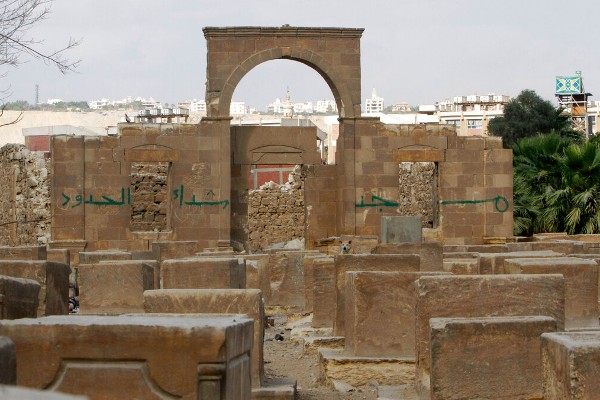Over Jewish protests, the Egyptian Antiquities Authorities removed a trove of items from a recently discovered genizah.
By Pesach Benson, United With Israel
A U.S. senator is demanding answers after the Egyptian Antiquities Authorities removed a trove of items from a recently discovered genizah in Cairo’s ancient Jewish cemetery.
A genizah is a storage area where religious texts and ordinary documents containing God’s name are set aside or buried. Such papers are typically stored in a synagogue and eventually buried with great respect, as Jewish law prohibits destroying the name of God.
For researchers, documents found in genizot often shed new light on history.
The genizah was found in Cairo’s Bassatine Cemetery, which dates back to the ninth century. It is believed to be the second-oldest Jewish cemetery in the world after the Mt. of Olives in Jerusalem.
After years of neglect, the cemetery is undergoing renovations, which the U.S. is partially funding.
According to Israel’s Kan News, officials from the Egyptian Antiquities Authority, after hearing about the genizah’s discovery, broke into the cemetery and dumped the contents into plastic bags without examining the contents. All this was done over the protests of local Jews, who demanded that a rabbi be involved.
Kan noted that the local Jews stress that they have no intention of taking the items out of Egypt.
According to the Jewish Telegraphic Agency, U.S. Senator Gary Peters (D-Mich.) is calling on the Biden administration to intervene.
The senator also contacted the U.S. Ambassador to Egypt Jonathan Cohen after Kan first broke the story.
“I urge you to protest the seizure of these documents to the highest levels of the Egyptian government,” Peters wrote in the letter, which the senator’s spokesman shared with the JTA.
The letter stressed that the papers are property of the Jewish community and that international experts be given an opportunity to examine the finds.
Cairo is also the location of the famous Cairo Genizah. Accounts say that European travelers were aware of its existence in the Ezra Synagogue as far back as the 1750s. Rabbi Solomon Schechter was the first to realize the significance of the genizah when two women brought fragments of letters to him in 1896.
Schechter later visited Cairo, and with the assistance of Cairo’s chief rabbi, examined and removed many of its contents which are now archived in a number of libraries around the world. Some of the manuscripts found are 1,000 years old.
The documents were primarily written in Hebrew, Arabic and Aramaic on paper and vellum, with some on papyrus or cloth. Scholars attribute the well-preserved conditions to Egypt’s dry climate and the fact that the room containing the genizah had been sealed for many years.
Send Passover Packages to Needy Israeli Soldiers - Bring Them Joy!
We are honored to thank the young men and women of the IDF who risk their lives every day to protect the citizens of Israel. Since October 7th, soldiers have been on the battlefield for months - many are hoping to come home for Passover.
Join us in sending Passover food packages (and personal notes) to Israeli soldiers and their families.
Many soldiers spend the Passover holiday with needy families back home. The soldiers greatly appreciate your love and concern. Bring them Passover joy!
CLICK HERE TO SEND YOUR PACKAGE AND NOTE TO ISRAELI SOLDIERS!




